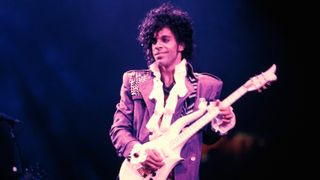In 2004, at the Rock & Roll Hall of Fame induction ceremony, Prince delivered a performance of “While My Guitar Gently Weeps” that would become legendary. Joined onstage by Tom Petty, Jeff Lynne, Steve Winwood, and Dhani Harrison, Prince unleashed a guitar solo that was not just musically breathtaking, but also laden with unspoken intent. It has since emerged that this iconic moment, often hailed as one of the greatest guitar solos of all time, was fueled by a perceived slight: Prince’s exclusion from Rolling Stone’s list of the 100 Greatest Guitar Players Of All Time the previous year. This revelation casts Prince’s performance of “Prince Still My Guitar Gently Weeps” in a new light, transforming it into an act of musical revenge.
According to a New York Times Magazine feature discussing an upcoming Prince documentary by Ezra Edelman, Questlove highlighted the context behind the explosive solo. The documentary suggests that Prince felt deeply slighted by Rolling Stone’s omission. What transpired onstage wasn’t merely a performance; it was a powerful statement of Prince’s unparalleled talent and artistry. The New York Times Magazine piece aptly describes it: “On its face, it’s a supreme expression of Prince’s superiority and bravura,” but the documentary reveals “a new context.” This context is the “disbelief” Questlove felt when Prince was absent from Rolling Stone’s prestigious list.
 2021 Remaster
2021 Remaster
The performance itself became instantly iconic. Prince’s emotive solo built to a crescendo, culminating in him launching his guitar into the air before confidently exiting the stage. This theatrical flourish only amplified the solo’s impact and cemented its place in music history. The New York Times Magazine feature further elaborates on the underlying motivation, stating, “Prince nursed these kinds of slights, and his commandeering of the stage – at an event associated with [founder] Jann Wenner and Rolling Stone – was, in part, an act of revenge.” The performance was imbued with “spite and aggression,” but also with “pain,” reflecting in Prince’s expression as “a small, soigné Black man onstage with these rumpled white rockers.”
Tom Petty, one of the “rumpled white rockers” sharing the stage with Prince that night, recognized the historical significance of the moment as it unfolded. He recounted to The New York Times in 2016, “You see me nodding at him, to say, ‘Go on, go on.’ He just burned it up. You could feel the electricity of ‘something really big’s going down here.’” Petty’s words underscore the palpable energy and undeniable virtuosity of Prince’s guitar playing during “prince still my guitar gently weeps.”
The message behind Prince’s performance, though perhaps subtle to the wider audience at the time, seems to have resonated where it mattered. Rolling Stone’s subsequent list of greatest guitarists, expanded to 250 entries, included Prince at number 14. While this recognition came after the fact, it suggests that Prince’s powerful statement on the Rock Hall stage did not go unnoticed. It’s worth noting that even this expanded list faced criticism, with debates over the rankings of guitar legends like Eddie Van Halen, Jimi Hendrix, and the exclusion of other guitar heroes.
 Prince performs onstage
Prince performs onstage
Despite debates surrounding guitar rankings, Prince’s legacy as a guitar virtuoso was undeniably amplified by his Rock & Roll Hall of Fame performance. It served as a potent reminder of his extraordinary talent and solidified his status as one of music’s most innovative and expressive guitarists. Ironically, while Prince’s guitar playing continues to be celebrated, the Ezra Edelman documentary that sheds light on this iconic “prince still my guitar gently weeps” moment and other aspects of his career may remain unseen. Prince’s estate is reportedly attempting to block its release, raising concerns about its potential impact on the legacy of Paisley Park. Meanwhile, a Vox HDC-77 guitar played by Prince is set for auction, offering fans a tangible piece of his remarkable musical history.
